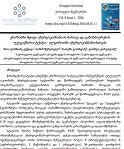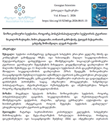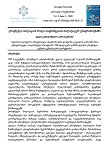Analysis and Classification of Factors Contributing to Personalization in E-learning
Downloads
The transformation brought about by digital technologies has significantly reshaped the field of education, giving rise to innovative approaches like E-learning that extend beyond the conventional confines of traditional education. One of E-learnings’ defining features is the concept of personalization, wherein learning approaches and content dynamically adapt to cater to the unique needs and preferences of individual learners. This research systematically classifies the myriad possibilities of personalization within the E-learning process. The developed classification encompasses factors of creating and delivering adaptive learning objects, employing learner-centered teaching methods, and personalization grounded in individual learner data. This classification structure enables the development of practical models for personalized learning by leveraging the features of contemporary Learning Management Systems (LMS), offering tangible benefits to both learners and tutors. This research enhances the academic discourse by providing a well-organized structure that elucidates the diverse factors of personalization within the context of e-learning. By classifying and discussing various factors, the research shows the perspective of integrating modern technologies in enhancing the personalized educational experience.
Downloads
A. John Martin, M. Maria Dominic and F. Sagayaraj Francis, “Learners Classification for Personalized Learning Experience in e-Learning Systems” International Journal of Advanced Computer Science and Applications (IJACSA), 12(4), 2021. http://dx.doi.org/10.14569/IJACSA.2021.0120485
Akhras, N, F, and Self, A, J, “Modeling the Process, not the Product of Learning” 2020, Computer as Cognitive Tools – No More Walls, pp 3- 28, 2000.
Beesuda Daoruang, Charun Sanrach, The Learning Material Classified Model Using VARK Learning Style, The Impact of the 4th Industrial Revolution on Engineering Education (pp.505-513), March 2020.
Tamar Bitchikashvili, Liliy Petriashvili, and Luka Kavtelishvili Jang. 2023. “DIGITALIZATION OF MANAGEMENT OF A HIGHER EDUCATIONAL INSTITUTION, NATIONAL AND INTERNATIONAL CHALLENGES AND WAYS OF SOLUTION”. World Science, no. 3(81) (September). https://doi.org/10.31435/rsglobal_ws/30092023/8032
Bruner JS. (1967). Towards a Theory of Instruction, Cambridge: Harvard University Press. Retrieved from http://www.hup.harvard.edu/catalog.php?isbn=9780674897014.
https://tech.ed.gov/files/2017/01/NETP17.pdf (Last check 30.01.2024)
Nona Otkhozoria, Lily Petriashvili, Ani Kudukhashvili, and Nino Kakhurashvili. 2023. “COMPARATIVE ANALYSIS OF COMPLEX INFORMATION SYSTEM TESTING METHODS”. World Science, no. 4(82) (November). https://doi.org/10.31435/rsglobal_ws/30122023/8076
George, T., Taliko, Z., & David, K. (2024, January). E-LEARNING PERSONALIZATION MODELS. In The 2nd International scientific and practical conference “Innovations in education: prospects and challenges of today”(January 16-19, 2024) Sofia, Bulgaria. International Science Group. 2024. 389 p. (p. 335).
Copyright (c) 2024 Georgian Scientists

This work is licensed under a Creative Commons Attribution-NonCommercial-NoDerivatives 4.0 International License.


























































































































































































































